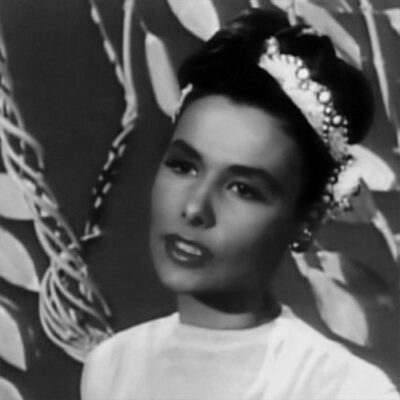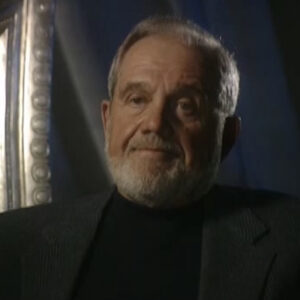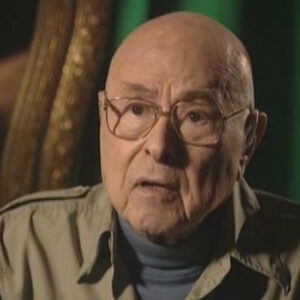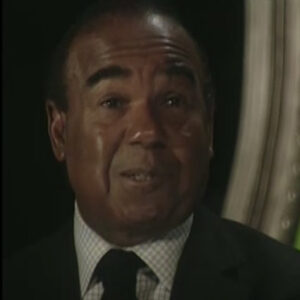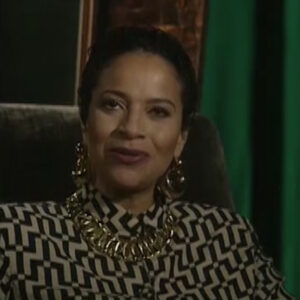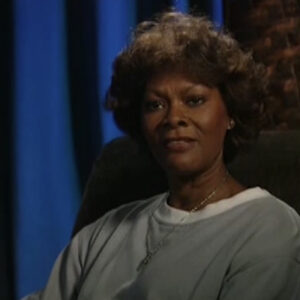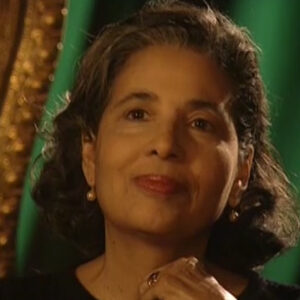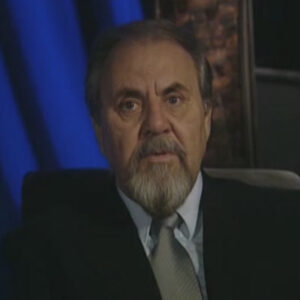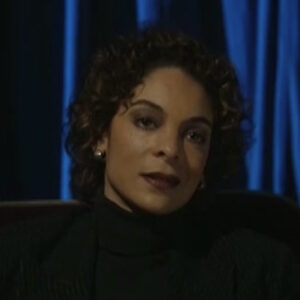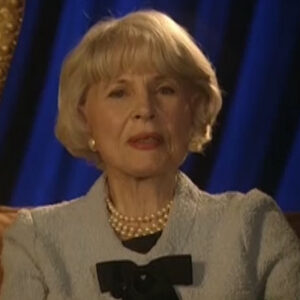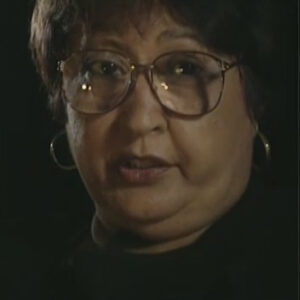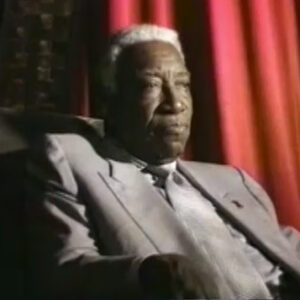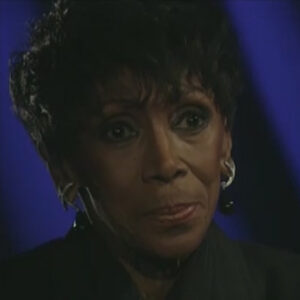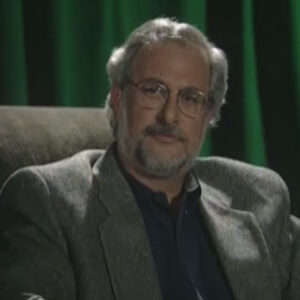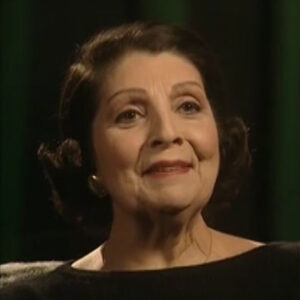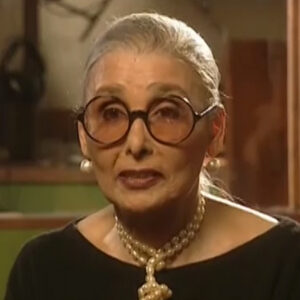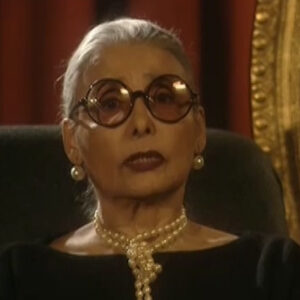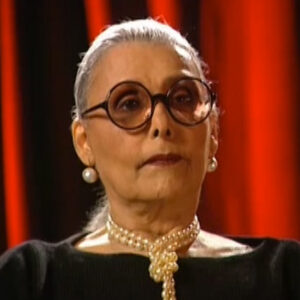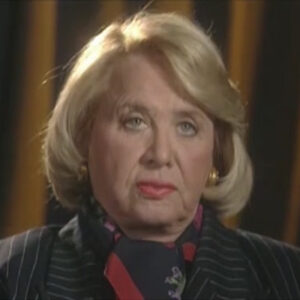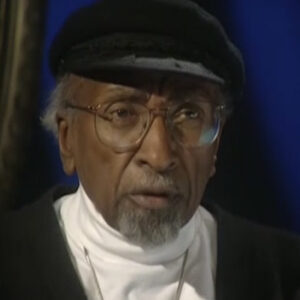Speaker Could you tell me when you were about to come to Hollywood? What was the reputation of MGM?
Speaker Oh, I think everybody knows about that, don’t they? There have been so many documentaries about MGM, and I think even the other studios admit that MGM did it better in every department.
Speaker They had the right stars, they had the right sound. They had the right artistic set decor and costumes. I mean, it really was tops in every way. And I don’t think they’ll ever be anything like it again.
Speaker Tell me about that.
Speaker Well, MGM was the tops among the studios and the freight unit was the tops within the studio. It had the most class. And Fred was a remarkable producer. He had wonderful taste and fallible judgment, I think. And Roger Edens is one of the unsung heroes of the Frade unit, because Roger was always right behind Arthur, sort of nudging him this way and that. And I think that at that Roger’s enthusiasm, Valene, I probably looked in very much when she was signed.
Speaker Oh, well, I don’t have to swim. I was just doing it probably through nervousness, but I won’t trouble. No, I won’t. I just won’t do it. If you ever seen Stephen Sondheim, he does this all his interview, he swims a little.
Speaker Oh.
Speaker I understand I’m trying to paint a picture of what Hollywood was when you got there. It was the personal experience of being in the field, it was like, do you remember any of the parties at your house?
Speaker I didn’t go to parties, but Roger gave wonderful parties. And I did go to Gene Kelly’s parties because they were kind of collegiate in town. People didn’t drink very much and we played charades. But the the usual Hollywood parties, I tried to stay away from them. For one thing, I knew that if I went to parties, my work would suffer. So I stayed close to my piano.
Speaker So Chaplin was telling me about Gene Kelly’s parties and about one in particular where I believe you were there and I was there and everybody would sing and play the piano.
Speaker I do.
Speaker I do it with Gene Kelly.
Speaker Well, we played charades a lot, but there was a lot of that. Yes, of course, Gene. Gene Kelly’s parties were my favorite parties of all time because I never liked parties, but I did love genes. They were wonderful people that you never knew whom you were going to see. But there wasn’t this this protocol and self-consciousness about who is making money in five digits and standing next to somebody is making money in four digits. Everybody just had a good time. It was like a college party. And I do remember the one with Lena. She was in wonderful form that night. And I think Roger played for her. I would have loved to, but Roger had seniority and he played for her and I played for my partner, Ralph Blaine. And we had a wonderful musical evening with Phil Silvers was there. And he’s the life of the party in a very special way. And I remember he sang a song about that Gene Kelly’s wife. You know, Frank Sinatra sang Nancy with the Laughing Face and felt sang it as Betsy with the laughing face. And we all loved that. We loved Betsy.
Speaker Let’s, uh, step back just a moment. Um, before you got to Hollywood, you were a.
Speaker Tell me what the chances were Cafe Society was to the other cabaret’s, as MGM was to the other studios, it had the best in jazz and in female popular singers. I don’t know why I said female to head man too, but the night I went, I was delighted to see this lovely young lady come down to the microphone and begin to sing. And I was quite taken with her looks and her singing. I always kept a little notebook with me to jot down the name of anyone I think is really going to be important in the world of entertainment. So out came the little black notebook and I wrote down the name of Lena Horne. She was her Lena Horne then. And I think when she dropped the H.E. and became Lena Horne, it did. It had a significant because Lena has always wanted not to have any pseudo elegance. She’s always wanted to be just Lena. And the name suited the image she wanted to project of being real and honest and down to earth.
Speaker Do you remember what she was?
Speaker I really don’t. I suppose it was just the standards of the day, you know, and some blues, some Duke Ellington, I think.
Speaker What was it about her performance that night?
Speaker I’ll tell you exactly what it was. It was the fact that she was an original.
Speaker You if one goes to cabarets and movies and Broadway shows a lot, you almost immediately when you see someone say, oh, yes, she derives from so-and-so and Lena didn’t derive from anybody. She just arrived from Lena. And actually, I don’t think anybody derived from her. She’s really an original. There’s no one like her.
Speaker And when is the next time we were signed by MGM the same year?
Speaker I do believe nineteen forty two and I was engaged with my partner outlined to write songs and do vocal arrangements and also to do vocal coaching. One of the first stars that was sent down to the little red schoolhouse where Ralph and I had our office was Lena Horne. Now, you know, that’s funny. Already I was teaching Lena how to sing. We learned a lot more from her when she learned from us.
Speaker What do you what is it that you do?
Speaker Stillness, quietness, OK?
Speaker Could you just taught me Lena Horne taught me to listen and not talk so much, because when one listens, one learns an awful lot. And I think Lena came on to the lot of Metro as a neophyte who had a lot to learn. And she kept her mouth shut and she listened to people like Roger and Arthur and became a great star through her innate talent, plus this wonderful listening and learning.
Speaker And when you were coaching, what was it?
Speaker What were you trying to bring out of what she didn’t need anyway?
Speaker Lena has always done great. I’m sure she sang great for 10 years before I ever met her. And she’s singing right now. So I didn’t really try to coach. I tried to find the right keys and get a little repertoire that would serve her well if she was suddenly called in to sing with Louis B. Mayer or something. I just wanted to have her ready to always show her best. So we we’re really just trying to find the right material in setting the keys.
Speaker Now, I understand you were helping her get her to play.
Speaker No, no. She was signed as a result of the little track. I never did even hear her there. Arthur and Roger heard it there. And then she was signed as a result of that engagement, I believe. But I never did help her with her material when she did her first dramatic part in Cabin in the Sky. I was looking forward so much to doing some work with her, but unfortunately, they didn’t assign me to that. I guess she worked with Roger and I did the Ethel Waters numbers.
Speaker Well, that’s very interesting that you did. Did you have any sense while you were working with lawyers that she felt particularly threatened?
Speaker Yes, we all knew that when you see when she did Cabin in the Sky on Broadway and I’m speaking of Ethel now, she was very jealous of Katherine Dunham, who played The Slave. Oh, yes, I did. OK, I did the vocal arrangements for Cabin in the Sky when it was done on Broadway originally. And the part of George Brown, which is about Lena played later, was portrayed by Katherine Dunham, who was another lovely, luscious, tempting looking young person who I thought was very jealous of. And when when we came to do it in Hollywood, she was even more jealous of Lena because Lena was even more beautiful than Katherine Dunham and Lena broke her leg. Did you know that during the the making your cabin in the sky and she was stumbling around on crutches and Ethel was just so delighted. She was sure the Lord had done that for her. But Ethel became a very wonderful and great Christian later on. This was before her born again experience.
Speaker Were you present when on that day when Ethel.
Speaker No, I heard about it. What did you hear that?
Speaker I really am not sure. I don’t recall much about that. That doesn’t sound terribly familiar to me. I just knew that Lane had broken a leg and that I thought was a little pleased about it. That’s really all I knew.
Speaker The energy and commerce, it was a place where a lot of folks gathered. Did you let me just ask, what are you what your spirit was in that whole setting and where she off to this?
Speaker You’ve just opened up an old wound that I’d forgotten about. Ralph and I once went over to the table and we didn’t know that. You don’t sit down unless you’re invited to. We went over and sat down and Lena was there, by the way. There were the ins and outs. Ralph and I were the outs Lena was in. She was accepted as as someone who could sit at that table and they froze us out. And we were very embarrassed. And I never went near that table again. But Lena was very accepted. She was not on the sidelines. Well, then he was the musical director for my first movie at MGM Best Foot Forward, and he conducted for her when she sang my song Love and did a brilliant orchestration of it.
Speaker What was it what was it like working?
Speaker I hadn’t planned to be this honest, but I didn’t get along with Lenny. Lenny made me feel threatened for some reason, and I think he sort of made fun of me behind my back. So I was a little uncomfortable around Lenny.
Speaker What did you think? His strengths?
Speaker Oh, he was a marvelous musician and he was a terrific orchestrator. I had no I couldn’t find no fault with Lenny as a musician. I just think that he didn’t particularly want me on the lot. I felt I felt he didn’t want me there. I don’t know why that might be unfair.
Speaker I don’t know if you were to. How would you characterize his personality?
Speaker Oh, he was fun. He had a good sense of humor and he was gregarious and musician particularly loved him.
Speaker If if you wouldn’t mind saying that again, oh. Mm hmm.
Speaker Oh, Lenny was a very attractive person. He was very popular. He had a great sense of humor. And musicians loved him and respected him. I loved him and respected him. I just felt a little rejected by.
Speaker Well, tell me about your first.
Speaker Well, I felt a little rejected there, too, because I thought it was a good song, not great, but good. And it was a little stir. All right. Now, Brazilian bogey, that was well, it really wasn’t the first song I wrote for Lena. I wrote Love First and I was afraid heard that there was a wonderful new song that a couple of people had heard. And he asked if he could hear it. Ralph and I did it for him. And he said, You mean you’re going to put that in Broadway rhythm? And I said, well, we were asked to. He said, Have you heard it yet? And I said, no. He said, Please don’t do that song for the other producer. I want that song. But the Follies, I want Lena to sing it in the Follies. Please write another song for Broadway Rhythm. And so I wrote Brazilian Boogie and it wasn’t as good as love, but I do think it came off because Lena sang it brilliantly and George Barzman made a fabulous orchestration of it. And I did a vocal arrangement and the whole thing was very exciting. I think the reason Lena didn’t care for it too much is that it was one of those happy natives, Caribbean things, and that was the stereotype she was trying to play down. And I don’t blame them. Could you just give us a little sample of what I’ll sing the first eight bars for you, but I hope you hope you can run the clip because it’s the orchestration that makes it.
Speaker And Boogie is more than twice as nice as Brazilian boogie woogie. It’s more than twice as nice as the samba rumba. It’s bound to be your favorite. No.
Speaker Mm hmm.
Speaker Oh, it was about nothing at all, I never even. Well, I don’t have a video of it, but if I do, I’m going to go right to President Bourgie and play that clip because the movie didn’t make any sense at all. It was really dumb. I was there, I would like to tell you a story about love that I don’t think even Lena herself knows, that was a wonderful set designer in the fraud unit called Lemuel Ayers. William, as I think they had Oklahoma on Broadway.
Speaker I know he did kiss me, Kate, and out of this world. And he was a great artist and a person of great integrity. And he was assigned the job of directing this sequence of love with Lena. And he was so excited about it. He loved the song and he adored Lena. And he went on to it and said, Arthur, I want to do something really innovative. Please let me do it. I want to shoot Lennon’s face in front of a backdrop of a beautiful color that will look wonderful with her skin.
Speaker And I want to leave the camera on there for two causes and never take it off. It’ll just be that great song and that great phrase and that great voice and no shenanigans. And Arthur really wanted to do it and Roger wanted to do it. But some stupid gopher at the in the front office leaked the news to the New York office, and everybody got scared and said, no, you can’t do that. People will get restless and we got to put in a Caribbean nightclub or something. And so they ruined it. In my opinion, it was beautiful because Lena was beautiful and the song is good, but I wish they had let them do it the way you wanted to do. It would have been fabulous.
Speaker That was just one of many roles in which you didn’t get to the. Act to interact with the stars. Uh, did she ever tell you about just being consigned to the.
Speaker Oh, yes, and talk to me about that frequently. It was a great frustration for her. And then when she didn’t get the part of jiggling showboat, that was a real heartbreaker because she was so perfect for it. Again, the front office got scared.
Speaker Arthur wanted her to play Julie that she believed she would play that.
Speaker Yes, she did the Julie songs from Showboat in Till the Clouds Roll By. And I think she had not been promised a part of Julie, but I think it was just taken for granted that she would play Julie in the remake of Showboat. And it really broke her heart when she didn’t get to do it because she was so perfect for it. And it’s one of those roles that come along once in a lifetime, the Helen Morgan role. You said to me, if the coach or I don’t think to lack the courage to do it, I just think that he had enormous power, but he didn’t have unlimited power. I mean, I could always veto him in the front office, occasionally could veto him when they turn him loose. He was infallible. I don’t think he made many mistakes.
Speaker What was the. Reputation.
Speaker Well, I haven’t read that famous biography of the man, so I don’t know as much about him as I should. I spent a few minutes with him in his office. When we Ralph and I were first signed, we went out and sang a song for him and he was extremely pleasant. And I’ve heard wonderful stories about him and I’ve heard some bad ones, too. He’s he’s broken up marriages and kept people from getting married and meddled in the lives of his stars a lot and done some cruel things.
Speaker What was your two years? What was that two years ago?
Speaker You really want me to talk about that? Because I feel I ought to talk about Lena. This is so personal, but I’ll talk about it and you cut it out if you want to. I was unhappy because I had just done a show on Broadway produced by George Albert and Dick Rogers.
Speaker Um, before we talk about leaving, let me just get back over love for a moment. Sure. That was such an important song and it was so important to heart that to make you want to hold it, could you? I do a few bars of love for us and tell us what all this means, I’m sure be glad to.
Speaker I just got off and say, you know, I love the food. Uh. You want me to hold onto it then, please?
Speaker All right, I’ll just play a few bars. OK. Tell me when to start before you start playing the intro. Oh, yes, I say, oh, I will. You ready for me to talk?
Speaker I’m going to play a few Bars of Love, which is a song I wrote Paulina to sing in Broadway Rhythm. But Arthur Freed heard it and said, I’ve got to have that song for the Follies. So we didn’t ever play love that the poor producer who who produced Broadway rhythm, he never got to hear it. And I wrote another song for that spot. And this is the way Love’s sounded.
Speaker And what about the use of the.
Speaker Well, he put it into the files, but I don’t think it was done well. He put it in a Caribbean nightclub. Well, a lot of people knifing each other and fighting and screaming and Lenar trying to make our presence felt through it all. It wasn’t satisfactory, in my opinion. It could have been done beautifully if they had just done a close up of know in front of a beautiful scrim experience for your family. Get to see how I went into the army the very day love was recorded because I looked on the album and it said recorded June 30th, 1944. And I thought, oh my goodness, I was a day I was indoctrinated into the army. So two years later, of course, I went immediately to my hometown, Birmingham, Alabama, and it just happened at Ziegfeld Follies, was playing at the Alabama theater. So I said, come on, fellas, let’s go. I want you to see Lena do my song. And we all tracked her down to the Alabama theater and it never came on. So we sat through the whole picture and I thought, well, it must be some mistake. I’ll ask for the manager and see what happened. Well, the manager just laughed at me. He said, oh, we always cut out numbers with colored people and nobody’s interested in that down here. And I really blew my top talk about Ethel Waters blowing on top. I top that or what is that? That was really mad because I felt I’d been fighting for just a sort of thing that I was witnessing and I didn’t do any good. He just laughed at me and we went home feeling very depressed about not not so much not seeing the number, but just about the South not having gotten any further. I don’t blame Lena for being a little angry about the things she went through for a while. I thought, oh, she’s overdoing it, you know, this angry thing. But when I found out what Lena went through, never being able to get a decent hotel room, never being able to go to a decent restaurant and being treated like a pariah, I sure don’t. I don’t think she was angry enough.
Speaker Now, it was sort of given the cold shoulder, MGM, after she refused to say. What was your feeling about that?
Speaker I didn’t know about that. That’s news to me. I wish she had done this woman because it’s such a beautiful score and Lena would have been wonderful in it.
Speaker What was the one thing about that?
Speaker Well, Harold Arlen and Johnny Mercer are just two of the very greatest artists in the business and wonderful together. The chemistry between them is beautiful. You know, come rain or shine.
Speaker If Lina had sung that, it would have been well, it was it was memorable anyway because the song was so great and the actress who sang it was good. But if Lina had done it, I think it would have been one of the great memories of Broadway forever.

